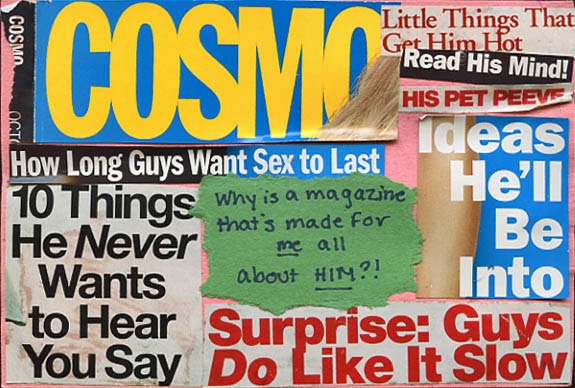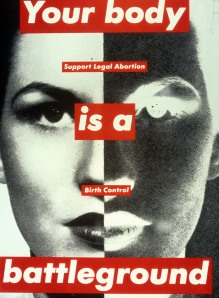I’m angry. Right now.
This isn’t just any run-of-the-mill anger. It’s the kind of seething anger that pops up every now and then without notice.
It’s anger without a reason.
This might sound crazy, but I’ll be perfectly happy one minute — and then ten minutes later I’m fuming. It literally comes from no where. There’s typically nothing that predicates it. It just happens.
I try to get rid of it — try to step away for a moment and breathe. The anger doesn’t happen all the time. But it happens enough. And I become bitter and resentful for an entire evening.
It’s truly awful.
It’s basically this — out of nowhere I become angry at the fact that I’m the woman in the house. And just to be clear — I LOVE being a woman. The anger stems from this feeling that there’s this unspoken, subconscious expectation of me based on my gender.
Don’t get me wrong — my husband is a feminist. A big one. He’s amazing. He pulls his weight. He supports me totally and completely. He loves his children fiercely.
Yet sometimes. Sometimes I can’t help but resent the fact that he’s a man (which I’m glad he is.) Although he cooks and helps with the cleaning, and splits night-time feedings 50/50 — I still feel short-changed as a woman.
Because I worry. I worry about every goddamn thing, and my beautiful husband looks so goddamned relaxed. The thing about Ernesto is that he knows how to kick his shoes off and read a book in the middle of chaos. He’s not being lazy — the man works his ass off. But he knows how to take a moment — a breather.
And I don’t know how to do that. As a woman, it’s ingrained in me to care for everything — even when it’s not necessary. There is this deep-seated unspoken expectation within myself to run the household. To make sure the kids get their baths, to do endless loads of laundry, to maintain the kitchen, to wipe down the bathrooms, to change the sheets, to make appointments for the kids, to schedule playdates, to sign the kids up for activities, to make sure the kids are well dressed, etc, etc, infinity, etc.
My husband does a lot. Hell, dinner wouldn’t get made without him. I wouldn’t have any food in my house if it weren’t for his diligent shopping expeditions with the kids. And did I mention he brings home most of the money?
So why am I angry? Why am I complaining? I decided to have a family — I should be grateful. What the fuck is wrong with me?
Last year my husband bought me a stack of books on feminism from the used bookstore. It was a lovely gift. One of the books called, The Bitch in the House (trying to tell me something babe?) is a compilation of works by various female writers that highlight the daily trials and triumphs of being a woman. I didn’t read the entire book. As a matter of fact I only read the first 20 pages. It was difficult to read a book about angry women when I have so much anger of my own.
For god sakes. I just want to be content. And happy. Which I am most of the time — about seventy percent of the time if you want an exact number — a number I would like to improve on.
But the first essay I read in The Bitch in the House was a piece written by E.S. Maduro, titled Excuse Me While I Explode: My Mother, Myself, My Anger. She writes about her feminist boyfriend — a man who was the complete opposite of her traditional, sexist father. In it she explains her seething anger as she realized that even the most feminist men can’t escape male privilege — that these men with all their progressive ideas about women, still unknowingly bask in the glow of that ultimate advantage. And it’s infuriating.
Here’s an excerpt describing her anger upon returning home from work and seeing her boyfriend relaxing and downloading music at the computer in the midst of a messy, dirty house:
On such occasions I will be angry for thirty minutes, or maybe until I have eaten something. I will ruminate on the place of the woman in today’s “modern” society. I will cook and clean, and all the while think about how I am falling into the same trap of housework that my own mother fell into. As I scrub the kitchen sink, I will hear her voice saying, “You have choices,” and I will scowl at the concept of choice. I will decide that my modern, liberal, open-minded boyfriend, having been raised by a mother who did everything in the home (in addition to having a job), will never notice or care if his girlfriend or wife takes over those same domestic responsibilities. He is capable of doing all of them, but if they get done for him, my thoughts go, he might never even realize that they needed doing in the first place.
What she continues to say brings full circle the very conundrum that clutches me.
But then slowly, as I finish picking up the dirty clothes from the floor, I will think about his day, will remember that he works long hours, too — and that he loves music, that finding new albums to record off our computer is a way for him to relax, to wind down. It will occur to me that maybe he was waiting for me to come home so that we could eat together, that he didn’t know I would be arriving so late; that he was sincere, rather than just trying to avoid a fight, when he offered to cook for me {. . .} gradually my anger will start to wane, and in it’s place will come guilt and confusion and sadness.
Maduro talks about how she wants and chooses to be angry.
I feel frustrated by the guilt that accompanies asking Paul to take the initiative to run the dishwasher, to do the laundry without shrinking my sweaters, to buy groceries that are healthy. . . to ask for what my mother never would have, to be what she would have considered a “nag.” In wanting my home to be as well organized as my mother kept hers, I feel as though I must choose between doing everything myself and constantly asking Paul to do more.
And this is where the resentment comes in. I don’t want to have to ASK my husband to do more. Why would I do that when he already does so much? I don’t want to be a nag. But I have certain expectations of how a house should run — how a house should feel. As a woman, I know how to run a house. Why? Because that’s how I was brought up. My mom did everything — cooked, cleaned, and raised four children. I watched her do it all. And even though my mom is a feminist, I felt the unspoken expectation that this is what I would do when I grew up — raise children and run a household. As a matter of fact, it’s what I WANTED to do. As a little girl I dreamed of being a mother.
And here I am with four children. Cooking. Cleaning. Running a household. Except I have an amazingly helpful husband. And there are many duties that we try to split evenly. But I’m angry that it seems easier for him. Easier for him to get out of the house — or so I think. Couldn’t I go out for a drink at night if I really wanted to? Ernesto would totally support that. But I feel guilty for WANTING to — because, well — I have other responsibilities, and the dishes need to be done, and the laundry needs to be folded, and Kiera needs to clean her room.
And it’s so obvious that I’m doing this to myself. Ernesto isn’t to blame. I WANT to be angry — to bask in momentary bitterness. But I don’t want to WANT to be angry.
See how this is totally my problem?
My husband is not the patriarchy. He’s my partner. As a woman I’m lucky to have all the choices that I have today — even though we, as women, have a ways to go.
Ernesto says that I can relax too. Why can’t I sit down for a moment and read a chapter out of my book? Why can’t I draw or write for twenty minutes? Ernesto feels no guilt, no shame, no concern about taking that small amount of time for himself to recoup. And he shouldn’t. He deserves that. But that’s — in part — because he’s a man. Kicking his feet up is okay and smiled upon. Our society practically encourages it despite the fact that we’ve come a long way. There are just some things that don’t stress him out the way it stresses me out. BUT THAT’S NOT HIS FAULT. It’s this never-ending cycle that’s all just a load of shit because I’m doing this to myself.
Really.
So in the musical words of my nine-year-old daughter, maybe I should “let it go.”
Yes. I just said that.
I need to find a way to let go of this unrest I feel as a woman. This underlying rage isn’t doing me or my family any favors.
It’s time to move on from this stagnant place — time to be grateful for everything I have. Time to stop wallowing in these “first world problems.”
I think I’ll step outside and breathe in the fresh air. And just let all this shit go.








